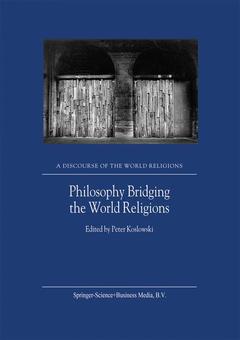Description
Philosophy Bridging the World Religions, Softcover reprint of the original 1st ed. 2003
A Discourse of the World Religions Series, Vol. 5
Coordinator: Koslowski P.
Language: English
Keywords
Philosophy Bridging the World Religions
Publication date: 12-2010
259 p. · 14.8x21 cm · Paperback
Publication date: 12-2010
259 p. · 14.8x21 cm · Paperback
Philosophy bridging the world religions
Publication date: 07-2003
259 p. · 21x29.7 cm · Hardback
Publication date: 07-2003
259 p. · 21x29.7 cm · Hardback
Description
/li>Contents
/li>Comment
/li>
Religions are the largest communities of the global society and claim, at least in the cases of Islam and Christianity, to be universal interpretations of life and orders of existence. With the globalization of the world economy and the unity of the global society in the Internet, they gain unprecedented access to the entire human race through modern means of communication. At the same time, this globalization brings religions into conflict with one another in their claims to universal validity. How can the conflict of religions be defused? The speculative, philosophical method of dealing with a religion is a way to present one's own religious convictions in the medium of philosophy and rational discourse. The philosophical approach to religion can serve as the basis of the conversation of the world religions, without dissolving their truth claims. It can reduce dogmatic claims and contribute to overcoming fundamentalism. Philosophy builds bridges between religions.
The series A Discourse of the World Religions presents with this volume the fifth and last of the EXPO-Discourses of the World Religions, which took place near the end of the World Exposition EXPO 2000 in Hannover, Germany. The five EXPO-Discourses were held before and during the World Exposition EXPO 2000 in Hannover with the objective of a philosophical-theological dialogue of religions about central themes of their teachings. The series aims at a deeper understanding of the similarities and differences between Hinduism, Buddhism, Judaism, Christianity, and Islam in their theological and philosophical propositions. It sees in philosophy a bridge between the religions and a means to overcome religious hostility and fundamentalism and to further the dialogue of the religions.
The series A Discourse of the World Religions presents with this volume the fifth and last of the EXPO-Discourses of the World Religions, which took place near the end of the World Exposition EXPO 2000 in Hannover, Germany. The five EXPO-Discourses were held before and during the World Exposition EXPO 2000 in Hannover with the objective of a philosophical-theological dialogue of religions about central themes of their teachings. The series aims at a deeper understanding of the similarities and differences between Hinduism, Buddhism, Judaism, Christianity, and Islam in their theological and philosophical propositions. It sees in philosophy a bridge between the religions and a means to overcome religious hostility and fundamentalism and to further the dialogue of the religions.
Philosophy as Mediator between Religions: Introduction.- Christianity and the Discourse of the World Religions: The Contribution of Philosophical Theology.- The Dialogue of Islam and the World Faiths: The Role of Speculative Philosophy.- Judaism: Intra-Religious Plurality as a Chance for Discourse between Religions.- Discussion of the Role of Philosophy in Christianity, Islam, and Judaism.- The Role of Good Manners as a Bridge between the World Religions in the San?tana Tradition (Hinduism, Buddhism, Jainism, Sikhism).- The Speculative Philosophy of the Triunity in Chinese Universism (Taoism) and Buddhism: Its Philosophical-Religious Significance and its Contribution to the Taoist-Buddhist-Christian Dialogue.- The Contribution of Religious Studies to the Dialogue of the World Religions.- Discussion of the Contributions of Good Manners, Triunity Speculation, and Religious Studies to the Dialogue of the World Religions.- Philosophical Dialogue of the Religions, instead of Clash of Civilizations, in the Process of Globalization, from an Islamic Perspective: With an Appendix: “In Europe there are no ‘Indigenous’ and ‘Imported’ Religions”.- Discussion of Dialogue instead of the Clash of Religions in Islam.- The Philosophy of the World Religions as the Philosophy of Revelations.- Discussion of the Revelations of the Religions.- Conversation between the Representatives of the World Religions after the Conclusion of the Public Discourse.- Contributors.- Index of Persons.- Index of Subjects to Volumes 1–5 of the Series “A Discourse of the World Religions”.
Title is also available as part of a set: Philosophy Bridging the World Religions (978-1-4020-0055-3)
© 2024 LAVOISIER S.A.S.




